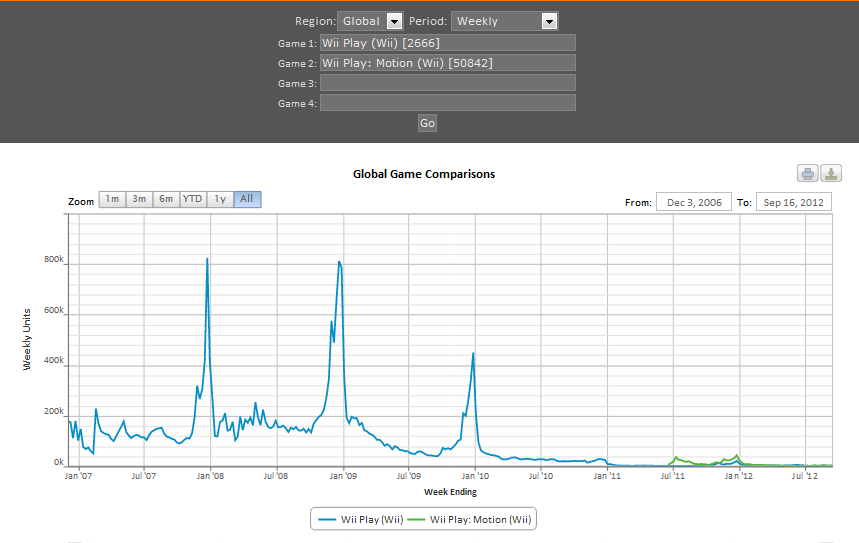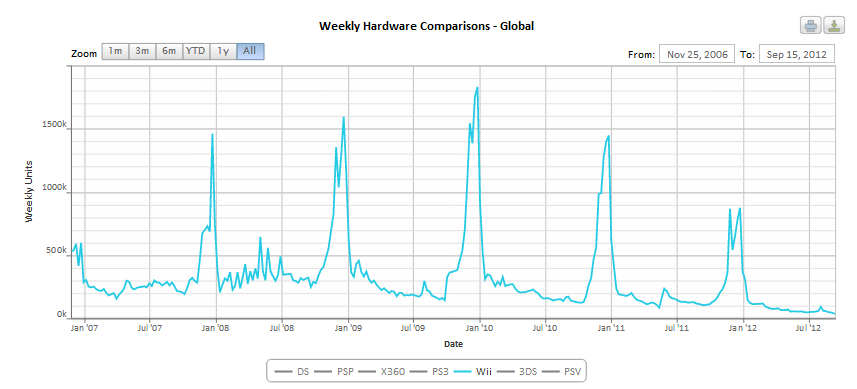| RolStoppable said:
If people would gobble up anything Nintendo releases, then all Nintendo games would sell in excess of ten million copies. Not even all games with "Mario" on the box put up big numbers. You mention games that sell for a long time and the reason why these games sell so well is because they are the best choice in their genre. I blocked off the "these people are idiots" argument preemptively, so you adjusted it to "these people may not have excellent taste" which is essentially the same argument sugar-coated. They don't have excellent taste based on which standard? That would only be your personal opinion, but nothing you could objectively prove. "Sales =/= quality" is a popular argument used by people who don't like that the games they like aren't the bestselling ones. But more importantly, the argument I put forward was "longlasting sales = quality", because "sales = quality" is indeed a flawed measurement. Pre-release hype can distort the perception of a game, so it may end up with (much) higher sales than it deserves which in turn makes using sales numbers as evidence for quality worthless. But if a product has already been available for months or years with hundreds or thousands of customer reviews out there, then there is no distortion anymore. If at this point the product still keeps selling, then you have evidently quality on your hands. The test of time weeds out bad games and lets good games shine. Now what is the better game between F-Zero and Kirby? Or between Star Fox and Paper Mario? Questions like these are hard to impossible to answer, because you are comparing different kinds of games and someone who doesn't like Kirby would inevitably say that F-Zero is better. More importantly, different games are bought for different purposes. Wii Play and Xenoblade Chronicles are so far apart from each other that comparing them doesn't make any sense whatsoever. On one hand you have an appetizer that is meant to ease people new to or inexperienced in games into trying out video games (and it's sold at a budget price; since it comes with a Wiimote it's definitely not a true $50 game which also helped its sales), on the other hand you have a highly complex JRPG for people who have been playing the genre for years. By default, the amount of people who fall into the former category (inexperienced with video games) is much, much, much higher than the amount of people who are experts in JRPGs, so even if both games fulfill their purpose perfectly, the former game will completely crush the latter game in sales. Both in the short term and the long term. So when you try to compare games in sales, it's important that the two games you compare try to satisfy the same demand of customers. A simple example is that a singleplayer-only game and a multiplayer-focused game don't make for a good comparison, because they are clearly bought for different purposes. But I think we are getting sidetracked here. The question was how important is prestige really? |
I'll put the sales debate under a spoiler tag so you can focus on the rest/
@underlined. I don't believe you can prove the contrary with sales, as we will tackle below.
@bold. I think that's a stretch, I won't argue it because you (and I) want to get to the heart of the question. I'll just tell you it's incorrect. For example, I have no problem with an excellent game not selling very well, as I know that Sales =/= quality. All I'm trying to show is that numbers are not adequate to reflect the quality of a game, in most cases. We know of the terms "Sleeper hit" and "underselling", as well as "cult niche games" and so on.
@F-Zero-Kirby. I honestly think that's a cop-out. Most people can recognize a killer app, and the late entries by Nintendo can rarely be considered that because they fall short of Nintendo's legacy, as many who have experienced it would agree. It's not a question of taste from genre to genre, it's a question of recognizable awesomeness, and that's to those who have been exposed to it in the past generations. I believe F-Zero, LttP, Super Metroid, and Kirby's Adventure, despite being of very different genres, are outstanding video games that are highly comparable in quality. I can't say the same about the latest entries. And I concede it may simlpy be my taste and the tastes of a few others I've talked to.
@Wii Play and XC. I believe that is a no-brainer. I have yet to play XC, but I have only heard good things about it. I can't say the same about Wii Play, which was fun, but was not excellent by any means. It is a reasonable game (not crap), but it is uncomparable with the greater games of the industry (in all its history). Simplicity isn't the question, nor is the target audience, the question is quality. I also find that the logic you offered doesn't fit well with the sales:


Having said all that, I will agree that it's important to compare apples with apples in terms of MMO/single/multi/online, as those have different calibers, and also sales based on price. Putting apples with apples, two single player games, no bundles, we have Wii Party at 7.80M and games like XC at .73M (almost 10 times less sales with no expected legs). Is quality truly an indicator of Sales, or is marketing, preference of the genre/gametype, etc?
If I were to follow your advice and compare sales within a category of "target audience", it would help the debate and would definitely help improve the metric of Sales = "Quality". But even then, a game may have the same "target audience", but reach a completely other target audience for x, y, z reason and lead to completely different sales, not giving us a clue on the variation in quality. Examples are Fable 1 vs SotC vs Zelda OoT. They all target the action fantasy audience, but reach very different segments due to different marketing, different platforms and different styles. So how far should we filter down until the metric becomes blunt?
"How important is prestige?", I like the question. I could answer that subjectively, but how could we measure concepts so as to make the judgement objective? Questions of value:
- How to define the level of prestige of a game?
- How to define the impact of a game on total HW and SW sales, and as such profit, and especially how over a longer period of time.
- How to measure the success of a game amongst other games that help sustain a system, with the theory that the synergy of those games are greater than the sum of their sales?
- How to define successful sales, over what time period, can it span generations? Can we use the concept of brand loyalty to accept a lesser sale as invaluable towards the sustenance of sales and interest in the brand in the future?
















